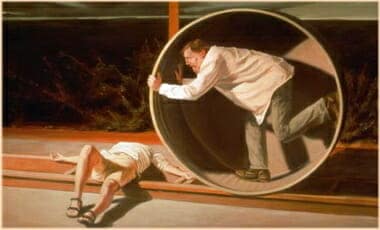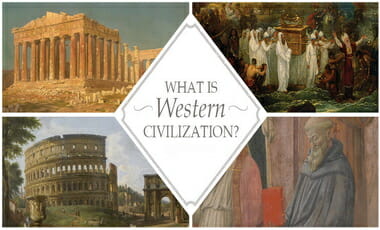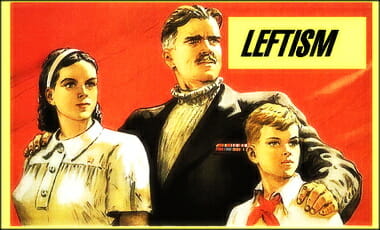- Vishal Mangalwadi, The Book That Made Your World: How the Bible Created the Soul of Western Civilization (Nashville, TN: Thoomas Nelson, 2011), 283-291.
ROMAN CATHOLICISM AND THE EMANCIPATION OF WOMEN
[p. 283>] Rodney Stark, in his authoritative study The Rise of Christianity: A Sociologist Reconsiders History, discusses the rise of Christianity in its early pagan Greco-Roman setting. Among other things, he explores the impact of the Bible’s commands concerning adultery, rape, murder, divorce, love for wives, care for widows, and so forth, on womanhood in general. The following is from a section entitled “Wives, Widows, and Brides”:
First of all, a major aspect of women’s improved status in the Christian subculture is that Christians did not condone female infanticide . . . the more favorable Christian view of women is also demonstrated in their condemnation of divorce, incest, marital infidelity, and polygamy. As Fox put it, “fidelity, without divorce, was expected of every Christian.” . . . Like pagans, early Christians prized female chastity, but unlike pagans, they rejected the double standard that gave pagan men so much sexual license. Christian men were urged to remain virgins until marriage, and extramarital sex was condemned as adultery. Chadwick noted that Christianity “regarded unchastity in a husband as no less serious a breach of loyalty and trust than unfaithfulness in a wife.”
Stark pointed out that Christian widows enjoyed substantial advantages over pagan widows, who faced great social pressure to [p. 284>] remarry. Augustus Caesar, for example, fined widows who failed to remarry within two years. When a widow remarried, she lost all her inheritance—it became the property of her new husband. In contrast, the New Testament required Christians to respect and care for widows. Well-to-do Christian widows kept their husbands’ estates, and the church sustained the poorer ones, giving them a choice whether or not to remarry.
Christians also expressed their respect for women by raising the age of marriage. Roman law established twelve as the minimum age at which girls could marry. But the law was nothing more than a recommendation. It carried no penalties and was routinely ignored. The best available studies show that in the Roman Empire the pagans’ daughters were three times more likely than Christians to marry before they were thirteen. By age eleven, 10 percent were wed. Nearly half (44 percent) of the pagan girls were married off by the time they were fourteen, compared with 20 percent of the Christians. In contrast, nearly half (48 percent) of the Christian females did not marry before they were eighteen.
Stark reported that in 1955, French historian Durry published his findings that Roman marriages involving child brides were consummated even if the bride had not achieved puberty. Durry thought that this was not the norm. However, substantial literary evidence has since emerged that consummation of these marriages was taken for granted. Pagan writers like Plutarch called this custom cruel and contrary to nature because it filled girls with hatred and fear. Christians, in contrast, could delay their daughters’ marriages because the New Testament gave them different moral standards—the same standard for men and women. The Bible’s sexual ethic gave Christian girls the time to grow up and become better wives and mothers.
SEX AND MARRIAGE
Rome’s classical culture did not see sex merely as secular pleasure. Like the Tantric sects in India, many Roman temples were packed with prostitutes—female as well as male. An 1889 study found that [p. 285>] quite a few married women of high-ranking families in the Roman Empire had “asked to have their names entered amongst the public prostitutes, in order that they might not be punished for adultery.”
Adultery was a crime with serious consequences because it was an economic offense, taking another man’s property (wife) —not because it was a matter of sexual impurity, a disruption of the holy union of husband and wife or a violation ‘of sacred vows. In fact, extramarital sex with a temple prostitute was considered a purifying, god-pleasing, religious event, if not the very means of Gnostic enlightenment. Even today, many Hindu gurus and Yoga teachers have sex with their female and male devotees on the pretext of “purifying chakras”—the psychic centers in one’s body.
Religious and aristocratic promotion of extramarital sex had colossal consequences. Easy availability of sex without commitment took away men’s motivation to be married. Dislike for marriage had become evident as early as 131 BC, when the Roman censor Quintus Metellus Macedonicus proposed that marriage must be made mandatory. Too many men preferred to remain single, leading the censor to concede: “If we could get on without a wife . . . we would all avoid that annoyance.”
Metellus continued, however, stating that men needed to take into account the long-term welfare of the state: “But since nature has ordained that we can neither live very comfortably with them nor at all without them, we must take thought for our lasting well-being rather than for the pleasure of the moment.” More than a century later, Augustus Caesar quoted this passage to the Senate to justify his own legislation on behalf of marriage. The need was obvious, the argument was compelling, but the legislation was not greeted with any greater enthusiasm the second time around. Historian Beryl Rawson wrote: ” [O]ne theme that recurs in Latin literature is that wives are difficult and therefore men do not care much for marriage.”
Another cumulative result of promiscuity, child marriage, mistreatment of women, divorce, and fear of marriage was that Rome’s pagan population began to decline during the final years of the empire. Unwed mothers and insecure wives (who feared divorce) [p. 286>] chose abortion and infanticide even if their natural instincts were for nurture and care. Toward the end of the second century AD, Minucius Felix charged in Octavius that religious mythology encouraged murder through infanticide and abortion:
I see your newly born sons exposed by you to wild beasts and birds of prey, or cruelly strangled to death. There are also women among you who, by taking certain drugs, destroy the beginnings of the future human being while it is still in the womb and are guilty of infanticide before they are mothers. These practices have certainly come down to you from your gods.
The long-term consequence of prostitution, permissiveness, singleness, divorce, abortion, infanticide, and decline of population was that Roman towns began to shrink in numbers and size. Eventually the empire had to depend on a constant influx of “barbarian” settlers. As early as the second century, Marcus Aurelius had to draft slaves and gladiators and hire Germans and Scythians in order to fill the ranks of the army. Consequently, Rome became vulnerable. The main challenge to this depressing trend came from the Church, which followed the biblical injunction to Adam and Eve to “be fruitful and multiply.”
Compared to the pagans, the Christians’ commitment to marriage resulted in more secure women and a higher fertility rate. Likewise, Christian opposition to infanticide and abortion resulted in a lower mortality rate. Together the Christian population naturally grew faster than that of Rome’s pagans. Christians’ choices in favor of sexual purity, stable marriage, and care for children, orphans, and widows aided civilization but were not caused by concerns for civilization. Their motive was to please God by obeying his Word.
During the first millennium AD, the Roman Catholic Church was the greatest force for the emancipation of women. In the beginning of the second millennium, however, the “cult of Virgin Mary”♦ and [p. 287>] the idea of earning salvation through religiosity led to an unbiblical exaltation of celibacy. The idea of “salvation by works” often leads to denial of comforts—certain foods, drinks, sleep, sex, marriage, etc. This mind-set—the denial of pleasure and the achievement of righteousness by pious works—caused people to view sex, marriage, family, and economically productive labor (necessary to sustain a family) as concessions for the spiritually inferior. The renunciation of marriage and the pleasures (and responsibilities) of family life were held up as pious virtues. Celibacy became public proof of spiritual superiority. Joining a monastery became the surest way to heaven. This spiritual pride led to gross prejudice against women.
For example, the popular Hammer Against the Witches (AD 1487) seduced Inquisitors to think that women were sexually .insatiable hyenas and a constant danger to men and their society. Tantric sexual permissiveness resulted in similar reactions in mainstream Hinduism—exaltation of asceticism and celibacy (Brahmacharya) with a degrading view of women as temptresses. The Hindu reaction went further than European exaltation of celibacy by considering physical matter, the human body, and sex as inherently evil, in contrast to spirit, which was good. For example, Swami Sivananda, the founder of the Divine Life Society and a pioneer of the modern guru movement, wrote statements such as:
Sex-pleasure is the most devitalizing and demoralizing of pleasures. Sexual pleasure is no pleasure at all. It is a mental delusion. It is false, utterly worthless, and extremely harmful.
Thankfully for the West, the sixteenth-century Reformation began restoring biblical norms for sexual mores. Reformers like Martin Luther argued that, according to God’s Word, sex and marriage were a means to holiness. The family, not the monastery, was the divinely ordained school of character. Acclaimed author and historian Roland [p. 288>] Bainton wrote: “Luther who got married to testify to his faith . . . did more than any other person to determine the tone of German [and Protestant] domestic relations for the next four centuries.” Luther’s home in Wittenberg became the first Christian vicarage after centuries. The biblical norms for family life that Luther taught remained virtually unchallenged until the end of the twentieth century.
Martin Luther’s attack on the Catholic idea of celibacy and his advocacy of the biblical idea of marriage did more to promote the Reformation than his attack on indulgences. He taught that according to the Bible some individuals are called to a celibate life. However, God’s normal plan for human beings is marriage. The doctrine that marriage is spiritually inferior or undesirable is “teaching of the demons.” Luther taught that the family, not the monastery, is God’s school of character; celibacy has become the devil’s trap to lure priests and monks into sin.
Initially, from 1517 to 1521, to ordinary Europeans the Reformation appeared as a matter of theological disputes between experts. Ordinary people woke up to it when priests began to marry as a result of Luther’s little book The Babylonian Captivity. Luther argued that the laws of men could not annul the command of God to marry. God ordained marriage for men before sin entered the world. Sex was a part of the material world that the Creator declared “very good.” Luther noted that the Scripture informs us: “Then the LORD God said, ‘It is not good that the man should be alone; I will make him a helper fit for him.’ In other words, God made Eve for Adam. She is good and necessary for him—a perfect gift planned by divine wisdom. God made only one woman for a man—the two of them to “become one flesh.”
Luther followed up his iconoclastic book with an Address to the Nobility. This presented the practical rationale for priests (not monks) to marry: A priest had to have a housekeeper; to put a man and a woman together was like bringing fire to straw and expecting nothing to happen. The unchaste chastity in the Church needed to be brought to an end. Priests had to be set free to marry. The natural, divinely ordained sexual drive needed to be recognized as a necessary, good, and honorable impulse.
[p. 289>] Luther—a monk—was still hiding in the castle of Wartburg to avoid being burned as a heretic, when three priests affirmed the rightness of his teaching by getting married. Archbishop Albert of Mainz arrested them. Luther sent a stern protest. Albert decided to consult the University of Wittenberg. Luther’s senior colleague and a highly respected scholar, Andreas Carlstadt, answered the bishop’s query by writing a book against celibacy. He concluded that, according to the Bible, a priest not only might marry but that he must marry and father a family. In place of obligatory celibacy, Carlstadt substituted obligatory matrimony and paternity. He went on to confirm his Bible study by setting a personal example. He got married.
Luther was delighted by Carlstadt’s bold decision. He was uncomfortable, however, with Carlstadt’s proposal that even monks should marry. Luther felt that the case for monks, like him, was different from that of priests. Monks had taken voluntary vows to remain celibate. It would be wrong to break those vows. That raised a new question: Did God enjoin the vows of celibacy? Luther’s answer helped create the modern concept of marriage as well as the modern politico-economic world.
The question forced Luther to go back to the Scriptures. He found the monk’s vow against marrying unscriptural and in conflict with charity and liberty. He sent his theses back to the university: “Marriage is good, virginity is better, but liberty is best” From the Bible Luther concluded that monastic vows rested on false and arrogant assumptions that celibate Christians had a special calling or vocation, to observe the counsels of perfection, which were superior to ordinary Christians who obey ordinary moral laws. Luther’s revolutionary conclusion is known as the “priesthood of all believers.”
Luther’s exposition of the Bible began to empty out monasteries. His exposition became the basic theological factor that enabled Protestant nations to develop economically faster than Catholic countries and to build egalitarian democracies. The family is a civilization’s primary engine for economic growth. If a man has no family, he might plant crops, but he is unlikely to plant and nurture trees and develop fields for coming generations. He might dig a cave or hew a [p. 290>] tree house, but he is unlikely to build a home for his grandchildren. The family motivates parents to plan, earn, sacrifice, save, and invest for future generations—for their physical as well as social welfare.
This “priesthood of all believers” negated a priest’s vocation as superior. Luther taught the cobbler was as important as the priest. All vocations had to be honored equally. Each had to be undertaken diligently as a service to God. This biblical priesthood of all believers challenged Europe’s class distinctions. It birthed the modern democratic equality of all citizens—rich or poor, educated or illiterate, old or young, male or female. Luther planted seeds in Europe that yielded their best harvest in America.
On January 10, 1529, Luther preached on the second chapter of the gospel of John. The passage recounts Jesus’ miracle of turning water into wine at a wedding in Cana at his widowed mother’s request. Luther encapsulated the intrinsic goodness of marriage, the priesthood of all believers, the equal value of every vocation, and the family as the school of character:
There are three estates: marriage, virginity, and widowhood. They are all good. None is to be despised. The virgin is not to be esteemed above the widow, nor the widow above the wife, anymore than the tailor is to be esteemed above the butcher. There is no estate to which the Devil is so opposed as to marriage. The clergy have not wanted to be bothered with work and worry. They have been afraid of a nagging wife, disobedient children, difficult relatives, or the dying pig or a cow. They want to lie abed until the sun shines through the window. Our ancestors knew this and would say, “Dear child, be a priest or a nun and have a good time.” I have heard married people say to monks, “You have it easy, but when we get up we do not know where to find our bread.” Marriage is a heavy cross because so many couples quarrel. It is the grace of God when they agree. The Holy Spirit declares there are three wonders: when brothers agree, when neighbors love each other, and when a man and a wife are at one. When I see a pair like that, I am glad as if I were in a garden of roses. It is rare.
[p. 291>] Radical feminists were not the first to see marriage as a “heavy cross”—a burden or slavery. Luther said marriage was slavery for men as much as for women. That is precisely why many men in pagan Rome preferred not to marry but to seek extramarital or homosexual relationships. Christianity made marriage harder for men by requiring that husbands remain faithful, committed, and loving to the same woman—no matter what—”until death do us part.” When a husband is forbidden extramarital affairs, taking a second wife, or divorcing a difficult wife; when he is not allowed to hate or be harsh with her; when he is required to love and honor his wife; then his wife is empowered. She has the security to seek for her dignity and rights.
Marriage brings out the worst in both husbands and wives. They must choose whether to stay in that school of character or to drop out. The Bible made divorce difficult because one does not learn much by quitting a challenging school. The only way to make monogamy work is to value love above pleasure, to pursue holiness and humility rather than power and personal fulfillment, to find grace to repent rather than condemn, to learn sacrifice and patience in place of indulgence and gratification. The modern world was created by countless couples who did just that. In working to preserve their marriages and provide for their children, they invested in the future of civilization itself.
♦ The Reformers saw it as a “cult,” since there was no biblical basis for praying to Mary or for assuming that she had remained a virgin after Jesus’ birth. There is biblical evidence that she had normal marital relations and children with her husband (Matthew 13:55-56; Mark 6:3; Galatians 1:19).













